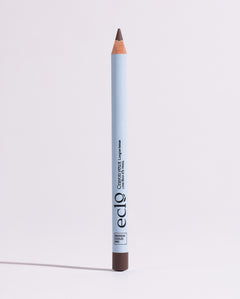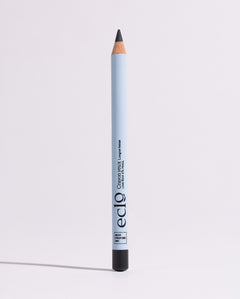ETX Daily Up has published an interview with Priscille, co-founder of Eclo, in the Beauty section, by Christelle Pellissier.
Leaving an international cosmetics giant to create a natural, regenerative French beauty brand more in tune with her expectations. This was the challenge taken up by Priscille Charton, co-founder of the Eclo brand, who has since teamed up with Julien Callede and Marin Susac to offer biodegradable and compostable make-up. The first of its kind. As the crowdfunding campaign launched on Ulule draws to a close, the entrepreneur looks back at the genesis of this new venture, and explains how Eclo makes all the difference.
"How was Eclo born?
I spent twelve years in the cosmetics industry with one of the world's largest beauty companies. It was exhilarating, but over the years I developed a desire to do things differently to meet the many ecological challenges of our time, as well as the needs of consumers. This urge was accentuated by a trip I took in 2014. I took a year's sabbatical, and set sail on the Atlantic, and what I saw floating every day in the middle of the ocean inevitably didn't leave me indifferent. I promised myself to innovate differently in cosmetics when I got back, but no matter how much I evolved and came up with new ideas, it was just too complicated to do things differently. So I contacted Julien Callede, co-founder of made.com, for advice on entrepreneurship, and his answer was quite clear: 'where there's a will, there's a way'. That was enough to convince me, especially as he was interested in my ideas, and a few months later became my partner.
What did you have in mind for this new adventure?
I had in mind the idea of creating a make-up brand with the same high standards for the skin and the planet.
This translated into biodegradable formulas that can run off into the water without damaging ecosystems, and products without any plastic at all, as packaging is a key issue in the cosmetics sector. We're very proud of the fact that our products are entirely biodegradable and compostable. Of course, it was also a question of fulfilling the basic contract of a make-up product, i.e. making it fully satisfying for the consumer. So the idea was to offer Cosmos Organic-certified formulas, without compromising on texture, hold or color.
How does Eclo differ from other, more traditional make-up brands?
Eclo is the first 100% natural make-up brand, from formula to packaging, and we also define ourselves as the first regenerative make-up brand. However, there was no question of sacrificing sensoriality for the sake of 'clean' - quite the contrary. The formulas were designed to be applied with the finger, which is also very innovative, and very pleasant because the textures are melting.
Eclo products meet different expectations, in terms of effectiveness and respect for the skin and the planet, but they also have to remain a moment of pleasure. That's our aim.
What is a regenerative make-up brand?
It was a sustainability consultancy that introduced me to the concept of regeneration. And the benefits of regenerative agriculture, which in particular helps restore biodiversity to degraded soils, inevitably interested us.
Today, we're working with the Pour une Agriculture du Vivant association, with whom we play the role of 'transformer'. This means we'll be educating all the players in the cosmetics industry's supply chain. This ranges from our laboratory, based in Brittany, to raw material suppliers and producers. With regenerative agriculture, the aim is to give full power back to the earth, putting living organisms back at the heart of the ecosystem, and naturally combating excess CO2 in the atmosphere, since regenerated soil has the capacity to capture more carbon.
But all this is a long-term project, and in the short term we've already chosen to focus on ingredients that have benefits for both skin and soil.
What are the main ingredients used in this make-up line?
- We chose hemp for the eyeshadow, as it is known for its moisturizing and soothing benefits, and also has the ability to clean and de-pollute floors.
- For the blush, we use rye, which comes from the Haute-Loire region of France, and has the particularity of giving a natural healthy-glow effect, and whose roots are immense; this helps to restore biodiversity.
- And for the last product, the lipstick, we opted for seaweed, found in Brittany, known for its smoothing and plumping virtues, and which is none other than the essential link in the marine ecosystem.
These are really the ingredients we're highlighting in the three families of our first range. We have the ingredients on one side, and the farming practices on the other, but we'd also like to work with farmers who are already working the land with this material for our future developments.
Unlike skincare, clean, eco-responsible make-up is not yet the norm.
Is it difficult to formulate green make-up products today?
Yes, because the specifications are technical and demanding, and necessarily limit what we can and can't use in our formulations. There's a lot of to-ing and fro-ing to achieve the optimum result.
Is it really possible to combine eco-responsibility with diversity, whether in terms of shades, textures or references?
Yes, it's entirely possible.
Inclusivity is a very important issue, because there has to be something for everyone.
We're currently working on a corrective foundation range, and we're inevitably asking ourselves these questions, but I'm more in favor of developing a formula that can cover the maximum number of skin tones. It's all a question of the formula's modularity and coverage. If it's high-coverage, it'll have to be available in fifty shades, but if it's modular, and we can dose the natural, second-skin or fuller-coverage effect, we can afford to have a shorter palette that will suit a wider panel. In the end, with ten shades, we can meet the needs of both very fair and very dark skins.
If we take this logic to its logical conclusion, fifty shades of foundation are not at all environmentally friendly.
The crowdfunding campaign launched on Ulule ends on May 6. How are you getting on?
It's going very well, with over 2000% of pre-sales out of an initial target of 100%. That was to launch production, so we're very happy.
What are the next steps in developing Eclo?
We're going to open the e-shop in May, then deliver to all participants in the Ulule campaign in June, and start retail distribution around the same time. We're being approached by a number of concept stores, so that's great. And of course we're working on new product families, but more on that later..."
This interview is available on the ETX Revolusound website - Read more



